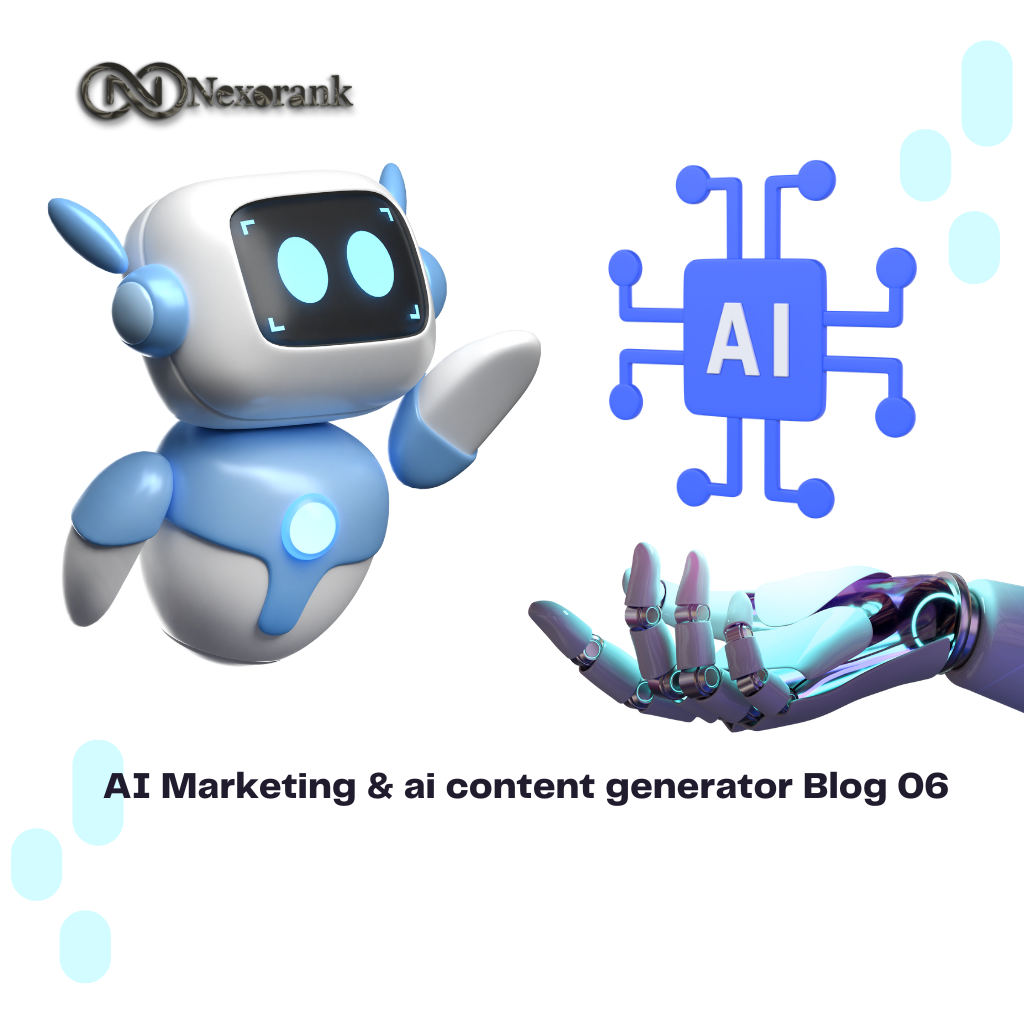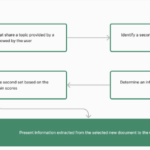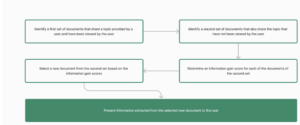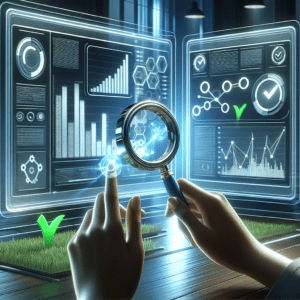Artificial intelligence (AI) systems like chatbots and AI assistants are becoming increasingly sophisticated and ubiquitous. While they can be incredibly helpful tools, it’s important to keep a critical perspective when interacting with and using AI.(ai content generator)
There are five primary reasons for this.
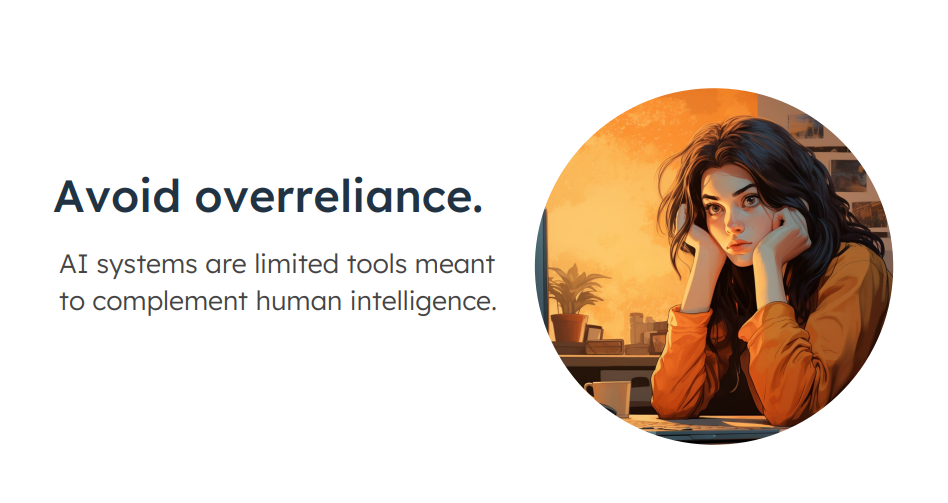
First, to avoid overreliance. AI systems are limited tools meant to complement human intelligence. Without critical thinking, it’s easy for people to become over-dependent on AI, losing their own judgment and discretion. Maintaining critical distance prevents surrendering too much autonomy to AI systems we don’t fully understand.
Kipp Bodnar, chief marketing officer, HubSpot
There is a risk that we can all start using AI too much in our marketing and become way over reliant. The biggest risk is that we all sound the same, because large language models are trained on a large data set. And if we keep all trying to do the same thing, it’s going to keep training that model in the same way, and we could be living in a sea of sameness. Your business and your competitors’ businesses could be saying the same thing, and customers wouldn’t really understand what’s different about each of your businesses, and why one is fundamentally better than the other. And so you want to limit your use of AI to help the customer experience, but not to be the sole foundation of all of your marketing and all your marketing content.
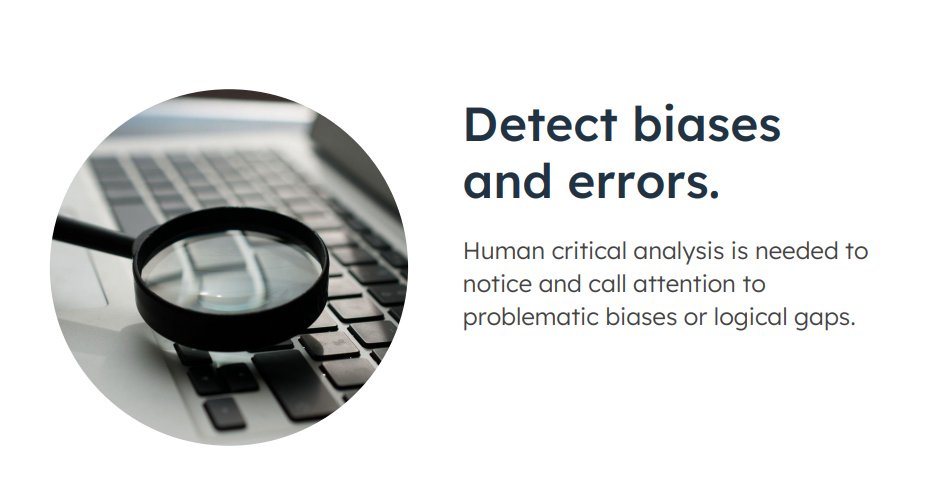
Second, to detect biases and errors. AI systems can reflect and amplify societal biases, as well as make mistakes, if created without enough oversight. Human critical analysis is needed to notice and call attention to problematic biases or logical gaps so they can be addressed.
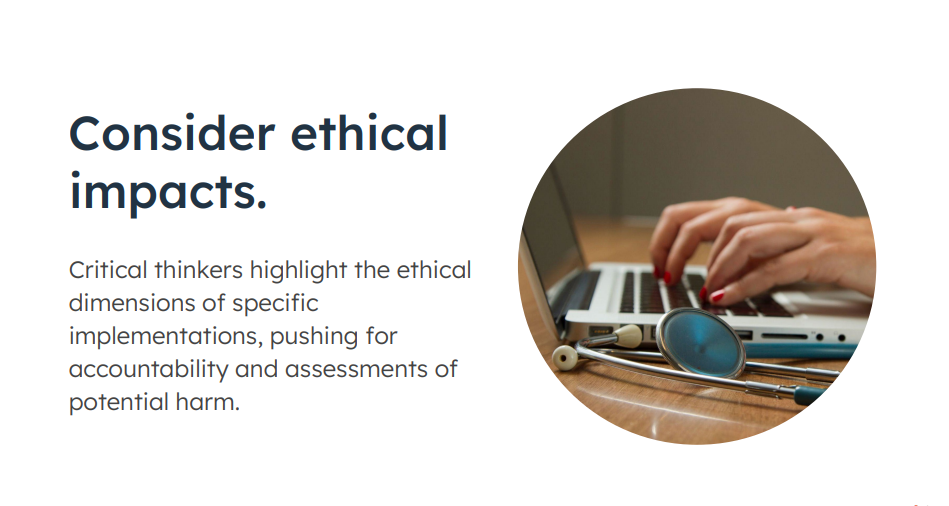
You also need to consider ethical impacts. AI is becoming entwined with sensitive social domains like healthcare, law enforcement, hiring, and finance. Critical thinkers highlight the ethical dimensions of these implementations, pushing for accountability and assessments of potential harm to the company and its customers.
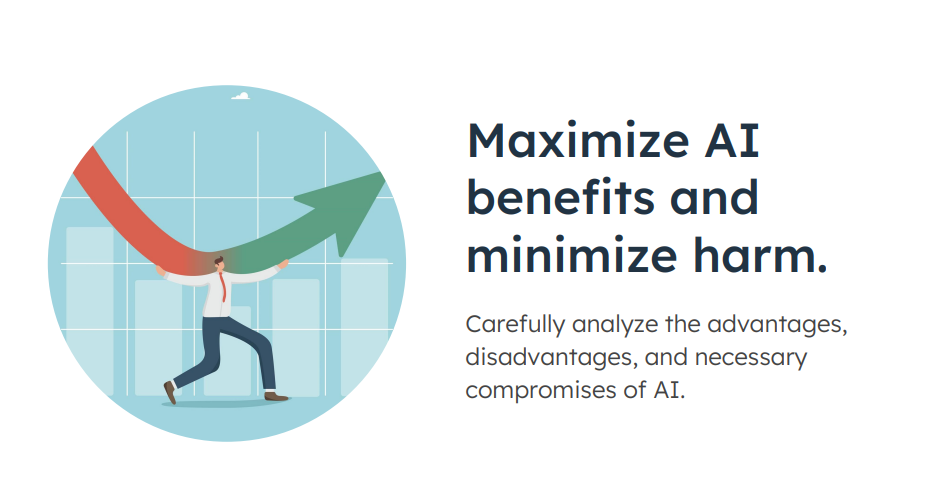
When using AI you want to maximize its benefits and minimize harm. We should carefully analyze the advantages, disadvantages, and necessary compromises of AI. This helps make sure that we can get the most benefit from AI and also reduce any harm it could cause. For example, we should avoid being overly enthusiastic about its responses (which could lead to over-adoption, or using AI too much) or the opposite, being overly apprehensive and mistrustful about AI, which may mean that potential benefits aren’t fully realized.
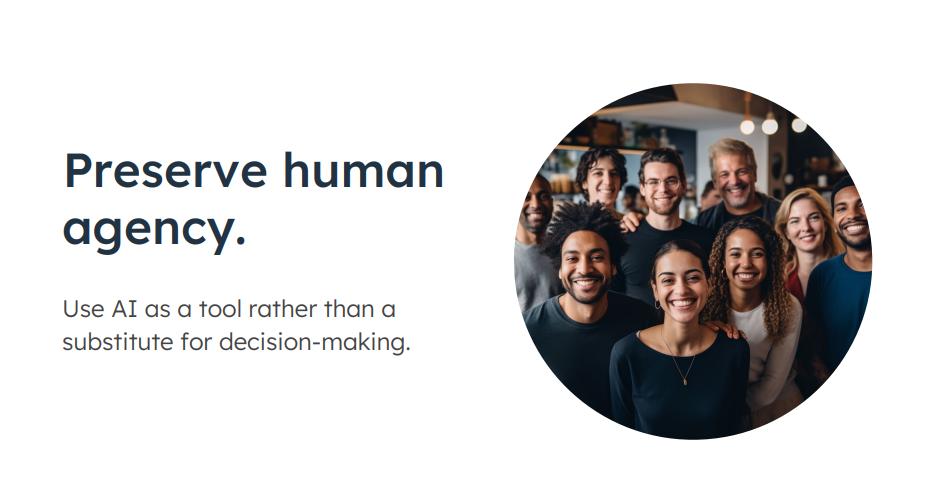
And finally, it’s important to preserve human agency. It’s crucial that we use AI as a tool rather than a substitute for decision-making.
Critical thinking skills play a vital role here. They help individuals to understand, evaluate, and use the information provided by AI, enabling them to make informed decisions. It’s important to maintain a balanced approach, using AI to enhance, rather than replace, our decision-making processes.
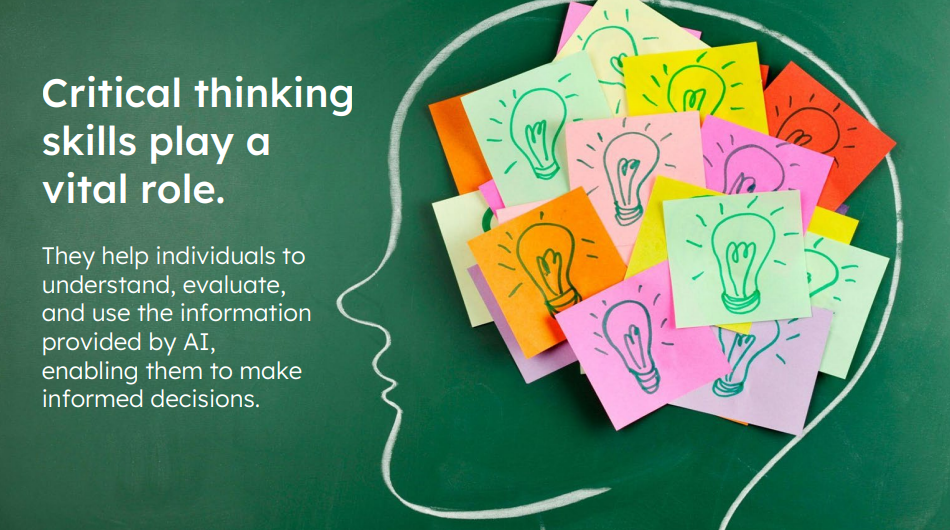
Now let’s go over some tips for how you can think critically about AI. Most of these are related to chat-based AI tools, but may be relevant for visual AI tools as well.
First, consider the AI source. When using an AI system, think about where it’s coming from. Is it created by a reputable company dedicated to ethics and transparency? Or does it come from a source with questionable motives? Knowing the creator can give insight into any potential biases built into the system.
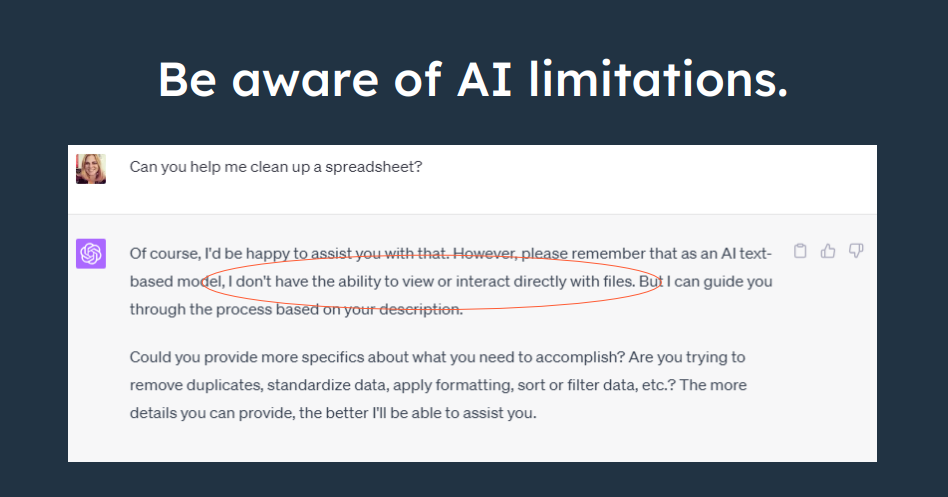
Next, be aware of AI’s limitations. Even the most advanced AI has limitations in what it can understand and do. For example, when asked if it can help with a spreadsheet, ChatGPT specifies that it doesn’t have the ability to interact or view files. Also, it’s good to keep in mind that AI can’t fully replicate human cognition or abilities. Recognizing these limits prevents overestimating its capacities. If you’re in doubt, ask the AI if it’ll be able to complete a task for you.
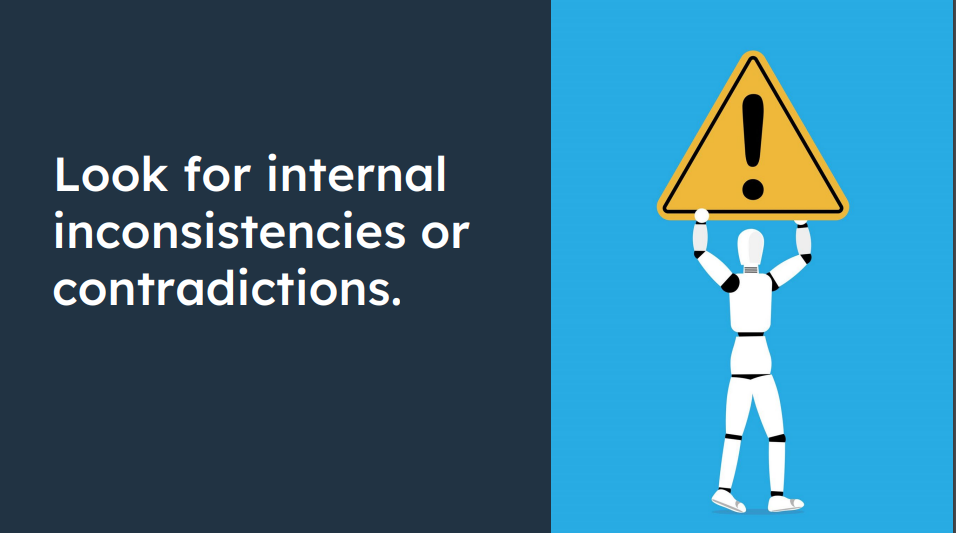
Look for internal inconsistencies or contradictions. AI can sometimes generate convincing text and conversations. But look closely and you may notice inconsistencies, absurd statements, or factual errors. Those are clues that the AI may not fully comprehend the context.
You’ll always want to verify the information the AI presents to you. It’s important to keep in mind that the apparent confidence of AI chatbots doesn’t necessarily mean they have true understanding or expertise. They rely on predefined data and algorithms and may not always have the ability to critically assess information or provide accurate responses in every situation. For example, when I asked Google Bard to identify some professors from HubSpot Academy, it gave me two people that are part of the HubSpot Education Partner Program, but aren’t actual Academy professors. This is a great example of why you should always verify information from multiple sources and exercise your own judgment.
Kipp Bodnar, chief marketing officer, HubSpot
When you’re thinking about reviewing content from an AI engine or large language model, you want to think about it just like a peer, just like another person who has maybe researched, done some writing, and provided some feedback to you. You’re not going to take what they tell you at a hundred percent true. You’re going to do some fact checking. You’re going to think about it deeply, critically. You might Google things or research things that you are uncertain about. You might even ask somebody else to put an extra pair of eyes on that project. The same thing is going to be the case for any output of a large language model or AI model. That’s the challenge here. It’s too often people are thinking about these AI models as the ability to give you a perfect answer. They’re not. They’re just like humans. They can give you a very good answer. But that answer needs to be refined through real review and critical thinking.
It’s also helpful to question the AI’s reasoning.
Asking the AI why it decided to respond the way it did may give you interesting and helpful information for reformatting your prompt or providing clarity to the output, as Claude did when I asked it about the structure of an article it helped me create, telling me it outlined three specific approaches with their pros and cons. This may help me decide to ask it to structure the article differently to highlight different aspects of the topic. Note that while some AI can now explain its reasoning, the explanation may be incomplete or lack nuance. Critically examining how and why the AI makes decisions can reveal gaps in its logic.
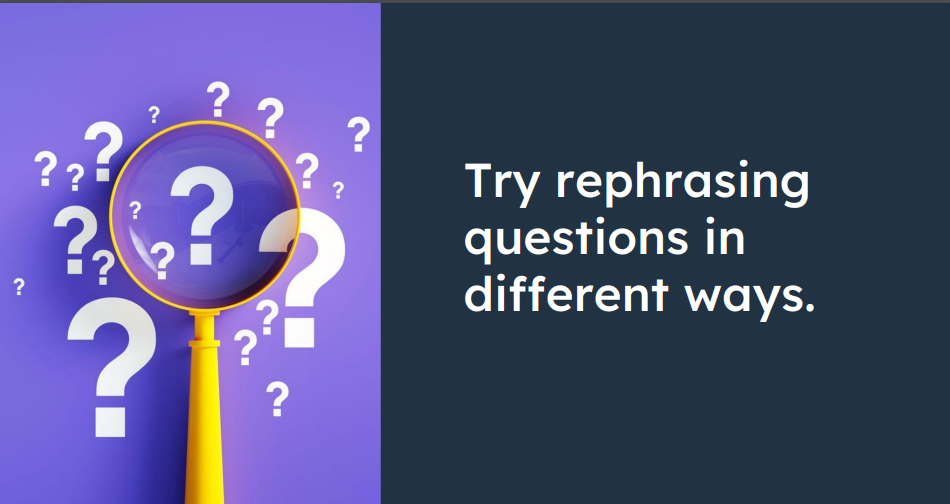
Try rephrasing questions in different ways. Probing with different question formats can give you interesting and useful content variations, but it may also help you see if the responses stay consistent or if the chatbot gets confused. Pay attention to the chatbot’s responses and make note of any inconsistencies. This information can help you adjust your prompts to improve their performance.
You’ll also want to pay attention to outputs for complex topics. Assess whether it recognizes complexity or oversimplifies. A chatbot may excel at straightforward tasks but struggle with the nuances, inconsistencies, and ambiguities inherent in truly multifaceted topics. Rigorously testing for oversimplification reveals these critical limitations. Provide it with challenging, nuanced inputs and prompts on the topic and assess whether its responses gloss over details, ambiguities, and complexities. Look for signs it is providing reductive, one-dimensional answers rather than answering with depth and context. By actively evaluating the AI’s responses against these signs, you can further optimize its output.

Additionally,
watch for biases. Like any technology, AI systems can perpetuate and amplify societal prejudices around race, gender, culture, and more. This is particularly true with visual tools. For example, you’ll likely find that all the people in visually generated AI results tend to align with media beauty standards. AI has been trained on large data sets from the internet, where thin, attractive people are the norm in our media and our marketing messages. Stay alert to these tendencies and favor transparent, ethical AI tools designed to avoid perpetuating unfair prejudice, while also paying attention to how you are crafting prompts to help eliminate biases.
And finally, don’t rely solely on AI outputs. Integrate them with input from additional trusted sources to provide checks and balances, identify errors and gaps, and lend additional context. Credible alternatives include feedback from experts, government reports, fact checkers, reputable news outlets, scholarly research, and think tanks. Current AI systems have limitations, so it is critical to evaluate and fact-check their outputs using multiple human and digital resources beyond the AI system itself. While AI can offer useful insights, it shouldn’t be viewed as infallible.
Josh Blyskal, AI solutions architect, HubSpot
It’s so important for marketers to critically evaluate AI-generated content because it’s our evaluation that actually defines the success or failure of that content overall. Think about it. Without a human in the loop, who’s going to know if that output was amazing or not? So great marketers need to look at the output from AI as a stepping stone on the way to a final product or a deliverable, because that’s really what the AI effort represents. To critically evaluate the content that AI produces is one of the most important steps, because here you’re going to check for brand safety. You’re going to check for any biases. You’re going to make sure that the content actually talks about the topics that you want in the way that you want. So from a business perspective, it’s where most of the value generation is actually cemented and solidified, and from a brand safety and personal, ethical and moral perspective. It’s how we make sure that our AI impact isn’t negative or harmful in any way. And that’s probably the most important part.
While AI systems like chatbots provide exciting new capabilities, maintaining a critical perspective is crucial. By considering the source, limitations, reasoning, and potential biases of AI, testing its responses, and verifying information, you can maximize the benefits these tools provide while minimizing risks. Most importantly, you must remember that AI lacks human understanding and judgment, so maintaining your own critical thinking abilities, agency, and discretion is vital as these technologies continue evolving. With thoughtfulness and care, AI’s immense potential can be harnessed to complement human intelligence rather than replace it.


